Meet our Researchers

Dr. Johanna Ospel specializes in innovative stroke therapy
Cardiovascular disease and strokes are closely connected. In fact, strokes increase the risk of heart attacks, heart failure, atrial fibrillation and other cardiovascular conditions. Conversely, patients with heart disease are more likely to have a stroke.
Dr. Johanna Ospel, MD, PhD, is bringing her expertise in stroke care and research to the Libin Cardiovascular Institute as its newest member. A Clinical Associate Professor in the Department of Diagnostic Imaging at the University of Calgary, Ospel is a radiologist who specializes in diagnostic and interventional neuroradiology. Continue Reading...

Researcher passionate about improving patient experiences
As an implementation scientist and patient-oriented researcher, Dr. Maoliosa Donald, PhD, is passionate about putting health research discoveries into practice.
Driven by a desire to help patients, clinicians and researchers alike, Donald’s job is to try to break through the barriers of human behaviours and system challenges to ensure new research findings are implemented into clinical practice.
“I went into research because I had the question ‘why aren’t we using the evidence and putting it into practice?’” says Donald. Continue Reading...
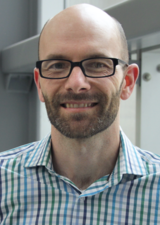
Researcher developing precise ways of selecting and dosing drug therapies
The use of psychotropic medications to treat mental health disorders and neurodevelopmental disorders in children and adolescents is relatively common. However, understanding what treatment will best suit a particular individual often comes down to trial and error.
Dr. Chad Bousman, PhD, an associate professor in the Dept. of Medical Genetics and the Institute’s newest member, is hoping to develop precise ways of selecting and dosing drug therapies for individual patients. Continue Reading...

Researcher studies mechanisms behind body’s response to exercise
Dr. Paolo Dominelli, PhD, an assistant professor in the Faculty of Kinesiology at the University of Calgary, is the Libin Cardiovascular Institute’s newest member.
Dominelli’s physiology lab focuses on exercise physiology evaluating exercise interventions with an eye to advancing health and wellness.
“Our main interest is looking at how the body responds to exercise from a cardiovascular, respiratory and muscular aspect,” says Dominelli. Continue Reading...

Researcher exploring mechanics of cardiovascular tissues
Dr. Taisiya Sigaeva, PhD, an assistant professor in the departments of Mechanical and Manufacturing Engineering and Biomedical Engineering at the Schulich School of Engineering, recently joined the Libin Cardiovascular Institute.
Her research focuses on the biomechanics of the soft tissues of the skin and cardiovascular tissues, such as the aorta and aortic valves, with the goal of better understanding how these tissues respond under in vivo loadings (mechanical loads applied to study these tissues). Continue Reading...
Respirologist and researcher joins institute
Dr. Doug Helmersen, MD, a respirologist and researcher, is the newest member of the Libin Cardiovascular Institute. Helmersen’s clinical and research speciality is pulmonary vascular disease, a broad term for any condition that impacts the blood vessels in the lungs, such as pulmonary hypertension and pulmonary embolism.
Pulmonary vascular disease is closely linked with the heart and heart disease, and Helmersen works closely with cardiologists in both his clinical and research work. Continue Reading...

Dr. Claire Allen
Dr. Claire Allen, MD, a new member of the Libin Cardiovascular Institute, has found the perfect niche.
She is an anesthesiologist whose practice focuses on vascular surgery at Calgary’s Peter Lougheed Centre (PLC) with a research focus on hemodynamic management in thoracic endovascular aortic repair and an interest in novel intraoperative blood management strategies. Continue Reading...

Researcher brings novel epidemiological research methods
Epidemiologist Dr. Amy Johnston, PhD, has a unique focus on women’s cardiovascular and reproductive health.
An assistant professor in the Dept. of Obstetrics and Gynecology at the Cumming School of Medicine, Johnston is passionate about developing novel epidemiological methods to address clinical questions, generating robust and actionable evidence through knowledge synthesis, and promoting equity, diversity, inclusivity and accessibility in research. Continue Reading...
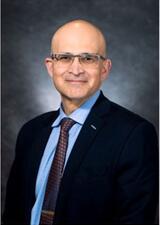
Dr. Bob Kiaii expert in robotics-assisted cardiac surgery
Clinician-researcher Dr. Bob Kiaii, MD, is the new section lead for the Division of Cardiac Surgery for the Calgary Zone.
A Professor in the Dept. of Cardiac Sciences, Kiaii comes to Calgary from the University of California Davis in Sacramento, California, where he served as chief of the Division of Cardiothoracic Surgery.
Kiaii, who formerly led the Minimally Invasive and Robotic Cardiac Surgery Program at the London Health Sciences Centre at Western University in Ontario, is a well-known expert and innovator in his field. Continue Reading...

Fixing the heart from within
Dr. Justin Deniset, PhD, recently joined the Libin Cardiovascular Institute. His work focuses on how the immune system contributes to normal heart function and how it modulates the healing response in the heart following infection or injury, such as a heart attack.
According to Deniset, an assistant professor in the departments of Physiology and Pharmacology and Cardiac Sciences at the Cumming School of Medicine, it’s an important area of research, because more people are developing heart failure, due to an increased rate of survival of heart attacks and other heart conditions.

It's all in the data
Using data from tens of thousands of patients to pinpoint diagnosis, best treatment and likely outcomes for individuals might sound like something out a science fiction novel, but researchers are doing just that.
Dr. Joon Lee, PhD, a health data science and machine learning researcher at the University of Calgary’s Cumming School of Medicine (CSM), is passionate about using artificial intelligence (AI) technology in health care to improve lives.
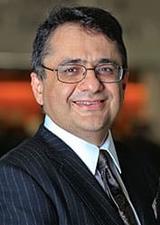
Researcher focuses on restenosis
Angioplasty, stenting and other similar procedures done to open occluded arteries save thousands of lives each year. But these revascularization procedures also have side effects.
About 40 per cent of people who undergo angioplasty, which involves removing build-up in the heart’s arteries using a balloon-like device inserted through a catheter, suffer from restenosis, a gradual re-narrowing of the artery after a blockage has been treated. Restenosis occurs because of tissue growth (scarring) at the site of treatment.
Stenting, done in conjunction with angioplasty, reduces the risk of restenosis to almost 20 per cent of patients. That number is also high, according to the clinician-scientist, Dr. Ramin Zargham, PhD, who recently joined the Libin Cardiovascular Institute.

Combatting CV conditions caused by cells that line the walls of arteries
When you think about the cardiovascular system, what may immediately come to mind is the heart and large arteries, like the aorta, that are responsible for moving large volumes of blood throughout the body. But the cardiovascular system is also made up of tiny blood vessels, about the size of a hair, that are not only responsible for carrying blood within tissues and organs of the body but are also critical in controlling blood pressure and regulating blood flow within these tissues.
It’s these resistance arteries, and in particular, the endothelium, the layer of cells that line the walls of the arteries, that are of interest to Libin Cardiovascular Institute researcher Dr. Andrew Braun, PhD.
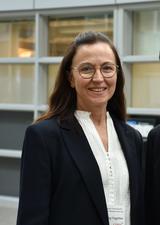
Improving patient care
Cumming School of Medicine researcher, Dr. Maria Santana, PhD, has spent more than a decade investigating and implementing ways to improve patient care and experience.
An associate professor in the Departments of Pediatrics and Community Health Sciences, Santana works to improve patient outcomes by engaging with patients, patient families and communities to determine her research priorities. Her partnership with patients doesn’t end there, she works with patients throughout the research process to ensure the patient voice is included in her research outcomes.

Fighting heart failure
When it comes to the cardiovascular system, the importance of the nano-sized particles called exosomes, can’t be overstated. Although tiny, exosomes, like RNA, DNA and proteins, are responsible for sending complex messages between the cardiac cells. As such, they play a critical role in the heart’s function and repair.
Dr. Vaibhav Patel, PhD, an assistant professor in the Cumming School of Medicine and a member of the Libin Cardiovascular Institute, is interested in the role of the exosomes in the development of cardiovascular disease and therapeutics, especially in the presence of diabetes.
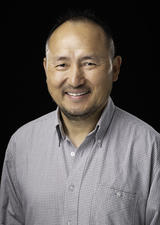
Researcher studies the role of smooth muscle in CV disease
Cardiovascular disease (CVDs) is the leading cause of death in Canada, accounting for almost half of all deaths each year. Globally, four out of five cardiovascular deaths are caused by heart attacks and strokes and one-third of these are in people under 70 years of age, according to the World Health Organization.
Numerous factors contribute to the risk of developing CVDs. Libin Cardiovascular Institute researcher Dr. Xi-Long Zheng, PhD, focuses on the role smooth muscle plays in this process.

Clinician-scientist focuses on improving lives of Albertans with heart problems
Dr. Derek Exner, MD, is focused on improving the health and wellbeing of Albertans with heart problems by using clinical trials to test therapies, then bringing those safe and effective treatments to the bedside.
A busy clinician-scientist and professor in the Libin Cardiovascular Institute at the Cumming School of Medicine (CSM), Exner’s clinical activity and research focus is on identifying people with heart rhythm problems.

Biomedical engineer joins Institute
Dr. Maryam Badv, PhD, could be described as a citizen of the world, but now the biomedical engineer has settled locally to begin her research career at the University of Calgary.
Born in Iran, Badv, an assistant professor in the new Department of Biomedical Engineering at the Schulich School of Engineering, spent her childhood in the Netherlands and Ontario, Canada before returning to her home country where she completed high school.

Dr. Norman Wong tackles genetic disorder leading to early onset heart attacks
Almost 20,000 Albertans are impacted by familial hypercholesterolemia, a genetic mutation that causes high levels of LDL cholesterol. This disorder can cause early heart attacks in individuals as young as in their 30s.
A healthy lifestyle can help prevent individuals with the genetic disorder from suffering heart attacks while still young, making awareness and education critical. However, most people with the disorder are likely unaware they are at risk.

Researcher using chair to impact kidney research in Canada
According to the Kidney Foundation, one in 10 Canadians has kidney disease, and 50,000 are being treated for kidney failure.
The Roy and Vi Baay Chair in Kidney Research at the University of Calgary was established to ensure leadership in research into kidney disease by providing funds to help recruit and retain internationally renowned researchers to the University of Calgary.

Data scientist brings expertise to Institute
Dr. Na Li, PhD, is one of the lucky few whose work is also her passion. Li, who joined faculty at the University of Calgary as an assistant professor in the Department of Community Health Sciences in January 2021, has a long-standing love for data that serves her well in her new role.
Li’s new job is within the Centre for Health Informatics, where she conducts health research applying data science and operations research into health care studies.

Clinician-researcher interested in solving unique health problems faced by women
As an endocrinologist, Dr. Jamie Benham, MD, PhD, treats people with conditions related to their hormones, such as diabetes. A large part of her clinical practice focuses on diabetes in pregnancy and polycystic ovary syndrome (PCOS), a common cause of female infertility that impacts up to 12 per cent of women of childbearing age.
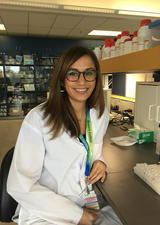
Researcher aims to provide personalized exercise interventions to enhance brain health
Proper blood flow within the brain is critical for cognition, so problems like blood clots, narrowing or blocked arteries or blood vessel rupture can be devastating. In fact, Alzheimer’s and some forms of dementia are linked to changes in the brain’s blood flow system. Both these conditions are more prevalent in females.

Clinician-researcher passionate about fairness and equity
New Libin Cardiovascular Institute member Dr. Shannon Ruzycki, MD, has a passion for justice and helping others.
A general internist who works with a wide variety of patients, Ruzycki is also an advocate for ensuring equity, diversity and inclusion (EDI) principles are upheld in the medical workplace, both between medical colleagues and health care practitioners and their patients.

Clinician-researcher passionate about optimizing care for patients with kidney disease
According to the Kidney Foundation of Canada, one in 10 Canadians has kidney disease and 50,000 are being treated for kidney failure. Forty-six per cent of new kidney patients are younger than 65. Individuals suffering with advanced chronic kidney disease may have numerous symptoms, like chest pain, fatigue, headaches, nausea and shortness of breath. Kidney disease is also linked with heart disease and can have a huge impact on quality of life.
New Libin Cardiovascular Institute member, Dr. Tyrone Harrison, MD, PhD, a kidney specialist and researcher, says individuals with advanced kidney disease are some of the most medically complex patients that health care providers see.
